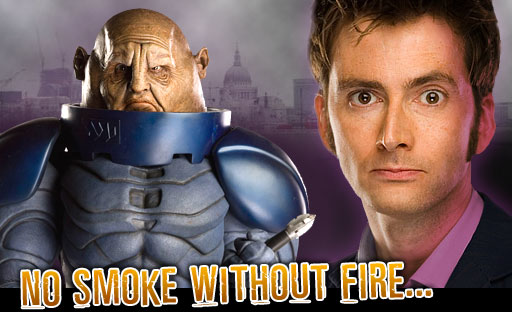
Aired 3 May 2008
‘The Poison Sky,’ just like ‘The Sontaran Stratgem’ that set it up, achieves exactly what it aims to do. It’s not designed to be a heavy-hitting piece of science fiction that will completely change the foundation of the characters and the programme by dealing with terrible human and moral conflicts, and it doesn’t pretend to be. Instead, the two-part story together offers an utterly entertaining tale of good versus bad while paying homage both classic and more recent episodes of Doctor Who along the way, and it’s fitting that the fourth and final early-series two-part tale of the Russell T Davies era is easily the best of the bunch.
The Sontarans have always been an interesting race but, other than when written for by their creator Robert Holmes, never seemed to really amount to anything overly meaningful. The characters in these stories have no qualms about pointing out how absurd their race and, indeed, their motivation to continue on an ages-old war with the Rutans is, and it’s really a testament to the entire team involved that the Sontarans transition so easily into the modern era without having to alter their appearance or menace into something it’s not designed to be. In fact, the story is successful exactly because the Sontarans are allowed to be treated like a joke- their door security able to be overridden by any person who shapes their hand into a three-fingered one- relinquishing a lot of the weight and emotional drama that sometimes felt too shoehorned in to previous early two-part stories. The end result is a more streamlined plot that gives enough exploration and payoff to its many component pieces.
Helen Raynor, of course, wrote ‘Daleks in Manhattan’ and ‘Evolution of the Daleks’ as a last-minute substitute, and the results and reviews were mixed to be sure. Fittingly, she is given another chance and, using a remarkably similar setup, achieves much greater success here. The concept of genetic modification and manipulation is much easier to accept from a clone race like the Sontarans than from a race like the Daleks that is supposed to think of nothing but destruction of anything that is not a Dalek. At this point, there have been several allusions to the Tenth Doctor’s time ending, but the concept of the Doctor perhaps wanting to die goes back much further. Fortunately, his more subtle and composed desire to give the Sontarans a chance to make the right choice, knowing it may result in his death, works exceedingly well and certainly much better than his bombastically extroverted plea to be killed in ‘Evolution of the Daleks.’
Once more, even in this more light-hearted affair, the Doctor’s flaws and follies are made apparent. This has been a continuing thread going all the way back to the Doctor thinking he knew better than Harriet Jones and not foreseeing the ramifications of his actions, and here attention is drawn to the fact that he is still technically employed by UNIT and that he desperately needs UNIT to emerge victorious and save Martha even as he claims to have an utter disgust for military and weaponry. Additionally, despite how much the Doctor tries to talk down to or over Colonel Mace, it’s the Colonel who is proven to be in the right. Once the Doctor stops to actually listen, even he concedes that Mace’s strategy involving the Valiant is a great one and that his more military actions are perfectly justified. The Doctor’s claim that he has earned the right to speak on behalf of humanity is a little unsettling as well even given how many times he has helped to save the world while championing the voice of the individual along the way.
The Doctor again proves that he knows a great deal more of what is going on that he initially lets on, and what does work quite well is using the boy genius Luke Rattigan as a sort of mirror to the Doctor, a showcase of what happens when someone who knows they are smarter than everyone else is left alone and unchecked too long, allowing the intelligence to turn to pride and arrogance. Rattigan’s ultimate redemption by sacrifice feels earned even if it is rushed, and in itself is a very Doctor-like action. Keeping the Doctor grounded has fallen squarely to Donna in this series, and it must be said once more that Catherine Tate continues to impress as a more mature companion who is completely unafraid to stand up to the Doctor. She’s incredibly intelligent and truly cares about each and every person she comes across, a perfect match for the Doctor who looks more at the big picture.
In the end, this story achieves what it sets out to do by telling a satisfying invasion tale with some very memorable moments along the way. Filled with some nice humour and characterization as another classic foe gets introduced to modern audiences and UNIT is more competently realized, this is another strong entry in the fourth series.


May 11, 2021
[…] Gallifeyan Ramblings; The M0vie Blog I & II; Spiralbound Notebooks; Tapetrade; Time Lord Archives; Junkyard View; Lyratek; Random Whoness; Doctor Who Reviews I & II. […]